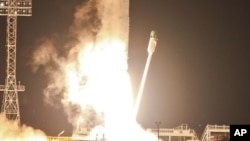Russia's unmanned Mars-bound space probe launched early Wednesday has veered off its intended course and is stuck in earth's orbit.
Russian space agency chief Vladimir Popovkin said an engine failed to fire on the unmanned spacecraft after it reached Earth's orbit. He said flight controllers will attempt to reboot a computer program and send the probe on its proper course within three days, before its batteries run out.
The $160 million probe began early Wednesday on what was expected to be a three-year trip to the Martian moon Phobos. Its mission is to scoop up soil samples from the moon and bring them back to Earth.
Plans call for the unmanned spacecraft to reach Mars in October next year, and land on Phobos, the larger of Mars' two asteroid-like moons, in early 2013 before returning to Earth with soil samples in August 2014.
The inter-planetary spacecraft was launched from the Baikonur Cosmodrome in Kazakhstan shortly after midnight Moscow time and successfully separated from its Zenit-2SB rocket about 10 minutes later.
The main objective of the three-year Phobos-Soil mission is to collect soil from the Martian lunar surface and return it to Earth.
Two Russian missions to Phobos in 1988 and a Martian lander mission in 1996 never reached their destinations. Experts say Russia hopes a successful Phobos soil mission will help boost the reputation of its space program.
Currently, only the United States, Japan and the European Space Agency have succeeded in carrying out scientific missions beyond Earth’s moon.
Some information for this report was provided by AFP, AP and Reuters.














